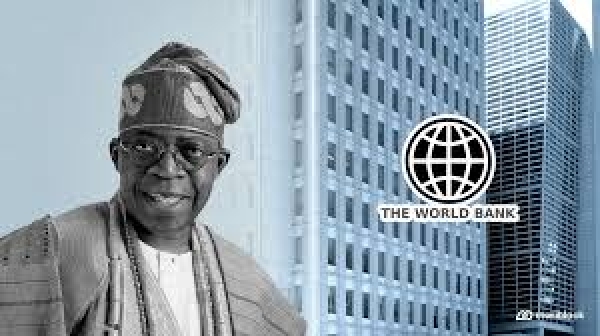The Federal Government is engaging the World Bank for two fresh loans totalling $580m, which are expected to be approved in March 2025, according to findings by The PUNCH.
Information obtained from the website of the World Bank on Wednesday showed that the funding is aimed at improving nutrition and education initiatives, with two projects currently listed in the bank’s pipeline.
The projects, Accelerating Nutrition Results in Nigeria 2.0 and HOPE for Quality Basic Education for All, are expected to receive final approvals on March 27 and March 20, 2025, respectively.
The HOPE for Quality Basic Education for All programme has a commitment of $552.18m, with $500m coming from the World Bank and an additional $54m from other sources.
The initiative is designed to tackle Nigeria’s education crisis, where over 17 million children remain out of school.
It is expected to enhance early childhood education, primary and junior secondary schooling, as well as expand access to learning resources.
The programme will be implemented by the Federal Ministry of Finance in collaboration with the Federal Ministry of Education and the Universal Basic Education Commission.
The project remains in the ‘Concept Review’ phase, requiring further consultations before being finalised.
The second loan project, the Accelerating Nutrition Results in Nigeria 2.0 project, is expected to secure $80m from the World Bank to address malnutrition and food insecurity.
The PUNCH further observed that $232m was approved on June 27, 2018, for the Accelerating Nutrition Results in Nigeria.
This initial loan project was faced with a number of challenges, leading to some changes, including the cancellation of some amount from the total approved loan.
However, the Federal Government is currently engaging the World Bank to get an extra loan for a second part of this project.
The PUNCH further observed that the approval day for the second part was moved from February 20, 2025, to March 20.
As Nigeria continues to struggle with a high rate of stunting among children, the project seeks to improve access to quality nutrition services, particularly for pregnant women, lactating mothers, adolescent girls, and children under five.
It will be implemented through primary healthcare facilities and community-based programmes.
Also, it will include interventions such as nutrition-smart agriculture to bolster household food security and dietary diversity.
Part of the funding will support project management, government coordination, and data-driven decision-making to enhance long-term sustainability.
This project is currently at the ‘Decision Meeting’ stage, indicating it is closer to final approval compared to the education initiative.
The approval of these loans is expected to enhance Nigeria’s human capital development by improving education and nutrition outcomes.
The World Bank has been a key development partner, funding various projects to address socioeconomic challenges in the country.
However, concerns persist over Nigeria’s growing debt burden, with economists questioning the government’s borrowing strategy.
The PUNCH further observed that the Federal Government, under the leadership of President Bola Tinubu, has secured loans worth $6.95bn from the World Bank in about 18 months.
Not less than 10 loan projects have been approved by the World Bank under the current administration.
According to data from the external debt report released by the Debt Management Office, the World Bank’s share of Nigeria’s debt totals $17.32bn, with the majority owed to the International Development Association, which accounts for $16.84bn, which represents 39.14 per cent of Nigeria’s total external debt.
The International Bank for Reconstruction and Development, another arm of the World Bank, is owed $485.08m, or 1.13 per cent.
The PUNCH earlier reported that the Federal Government spent $3.58bn servicing its foreign debt in the first nine months of 2024, representing a 39.77 per cent increase from the $2.56bn spent during the same period in 2023.
This was according to data from the Central Bank of Nigeria on international payment statistics.
The significant rise in external debt service payments shows the mounting pressure on Nigeria’s fiscal balance amid ongoing economic challenges.
The World Bank, in its recent International Debt Report, revealed that developing nations spent an unprecedented $1.4tn on foreign debt servicing in 2023, driven by a surge in interest rates to their highest levels in 20 years,
Interest payments alone reached $406bn, a nearly 30 per cent increase from the previous year, severely impacting spending in critical sectors such as health, education, and environmental programs.
According to the report, the most vulnerable economies, those eligible for loans from the World Bank’s International Development Association, bore the brunt of the financial strain.
In a statement on Monday, the Federal Government reaffirmed its commitment to reducing reliance on external debt financing and driving economic independence through strategic partnerships with the World Bank.
The Minister of Finance and Coordinating Minister of the Economy, Mr Wale Edun, made this known during a meeting with the World Bank Executive Director, Dr Zainab Shamsuna Ahmed, where he outlined Nigeria’s shift towards private sector-led growth.
The statement read, “Edun emphasised that President Tinubu remains focused on strengthening Nigeria’s economic foundation, reducing dependency on external borrowing, and ensuring long-term, private-sector-led development.”
Edun acknowledged the critical role played by the World Bank in Nigeria’s development but stressed that the government is prioritising a business-friendly environment to attract sustainable investments.
This is part of a broader strategy to explore alternative financing models beyond traditional multilateral loans.
The administration’s economic plan focuses on fostering fiscal responsibility while ensuring that private capital is mobilised to drive economic expansion and job creation.
Ahmed, who previously served as Nigeria’s Minister of Finance, commended the government’s macroeconomic reforms, which she noted have improved fiscal stability and bolstered investor confidence.
She also highlighted recent financial reforms within the World Bank that have strengthened its lending capacity, unlocking an additional $150bn in funding over the next decade.
This, she said, presents an opportunity for Nigeria to tap into strategic support while maintaining fiscal discipline.


